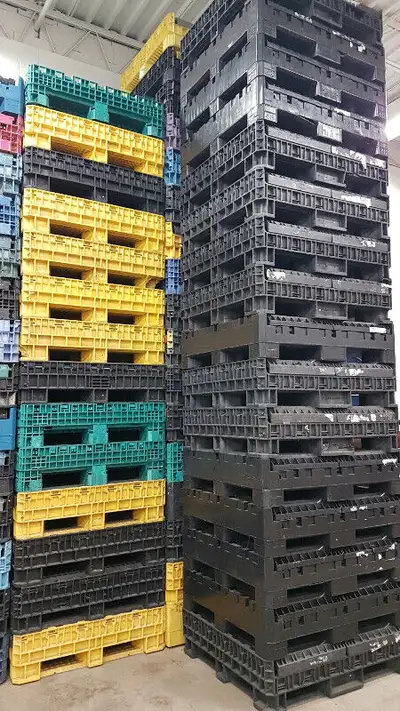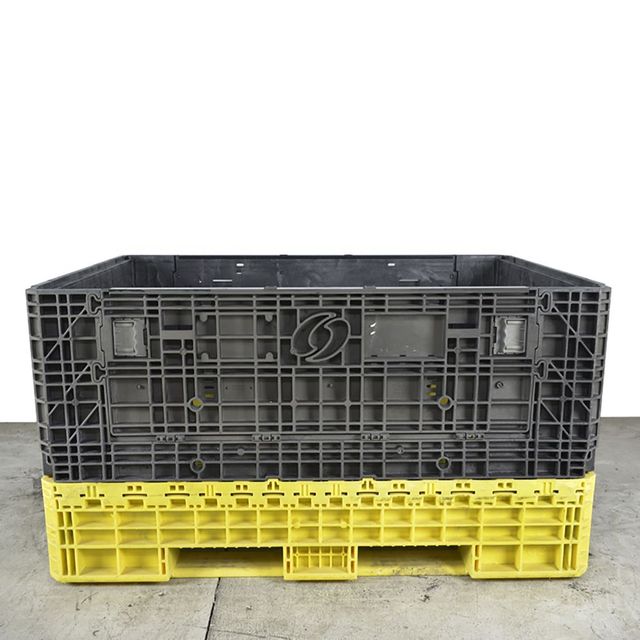Why Mass Containers Are Important for Sustainable and Affordable Transport
Mass containers play an essential duty in modern-day logistics. They assist in the effective motion of big quantities of products, thus enhancing transportation procedures. This technique not only minimizes prices however also decreases environmental influence through lower emissions and waste generation. As industries look for even more sustainable techniques, the fostering of bulk containers is ending up being increasingly substantial. What effects does this shift hold for future logistics and supply chain monitoring?

The Benefits of Utilizing Mass Containers in Logistics
Bulk containers reinvent logistics by enhancing performance and sustainability. These containers allow for the transportation of huge quantities of goods in a solitary journey, significantly lowering the number of journeys required. This not just simplifies procedures yet also minimizes labor prices related to handling, loading, and dumping. Furthermore, mass containers are developed to enhance space usage within transport automobiles, guaranteeing that more items can be shipped all at once.
The standardization of bulk containers additionally streamlines the logistics process. With consistent dimensions, they can be easily stacked and stored, causing enhanced stockroom administration. Furthermore, mass containers often include long lasting materials that shield materials from damage throughout transit, consequently reducing item loss and boosting overall integrity. Therefore, services can experience enhanced supply chain performance, ultimately bring about boosted earnings and client fulfillment. This combination of aspects makes mass containers an essential possession in modern logistics.
Environmental Influence: Minimizing Waste and Carbon Footprint
As markets increasingly focus on sustainability, the adoption of mass containers has actually become an essential method for minimizing waste and decreasing carbon footprints. These containers reduce making use of product packaging materials, such as boxes and plastic, thereby especially decreasing overall waste generation. By combining shipments, mass containers improve transportation effectiveness, enabling even more items to be moved per journey. This decrease in journeys straight associates with reduced greenhouse gas exhausts, adding to a smaller carbon footprint.
Bulk containers can frequently be recycled or reused, further alleviating ecological effect. The longevity of these containers assurances they can endure several transportation cycles, lowering the requirement for single-use options. used plastic containers. By simplifying logistics and promoting reliable resource usage, bulk containers not just sustain lasting methods however also motivate industries to align with worldwide ecological objectives. Inevitably, their execution mirrors a commitment to environmental stewardship and responsible source management
Cost Cost Savings: Exactly How Mass Containers Lower Transport Costs
While many companies look for means to improve their lower line, the usage of mass containers presents a significant chance for decreasing transportation expenses. Bulk containers maximize the quantity of items transported, permitting businesses to deliver bigger amounts simultaneously. This effectiveness minimizes the number of trips called for, directly lowering fuel costs and minimizing labor costs linked with loading and discharging.
In addition, mass containers commonly feature streamlined layouts that enhance area usage within transport lorries. This means less vacant areas, bring about much more efficient use of available capability. Moreover, the resilience of bulk containers can lower the risk of product damages throughout transit, minimizing losses and making sure that even more items get here intact.
Enhancing Supply Chain Efficiency With Bulk Storage Solutions
Mass storage options play an essential duty in boosting supply chain performance by maximizing supply administration. By settling goods right into less, bigger containers, companies can substantially reduce handling expenses associated with regular transfers and processing. This structured method permits far better monitoring and administration of stock, ultimately causing enhanced operational efficiency.
Structured Supply Administration
Reliable supply administration is important for optimizing supply chain procedures, particularly when companies embrace bulk storage services. These remedies make it possible for services to preserve greater stock degrees while reducing the regularity of replenishment. By combining materials right into mass containers, companies can simplify their inventory processes, minimizing the complexity connected with tracking several smaller plans. This approach assists in accurate stock counts and improves forecasting precision, enabling for more educated decision-making. Furthermore, bulk storage space services streamline warehouse organization, making it less complicated to locate and access items when required. Therefore, organizations can achieve an extra efficient inventory turnover rate, inevitably enhancing overall supply chain efficiency and minimizing the probability of stockouts or overstock scenarios.

Reduced Handling Expenses
The implementation of bulk storage space services not just improves stock administration but additionally significantly minimizes managing prices across the supply chain. By settling materials right into bulk containers, firms minimize the need for frequent handling and transfer between different storage and transportation devices. This method lowers labor costs related to loading, unloading, and relocating smaller sized plans. Additionally, bulk storage space reduces the frequency of deliveries, resulting in lower transport expenses and lowered gas consumption. Consequently, organizations can enhance their logistics procedures, permitting for a more reliable allowance of sources. Ultimately, lowered taking care of costs add to improved general supply chain efficiency, promoting an environment that supports both sustainability and financial stability.

Adaptability of Bulk Containers Across Numerous Industries
Although several industries have unique needs for transportation and storage, bulk containers have emerged as a versatile remedy that fulfills a large range of needs. These containers, varying from large containers to specialized tanks, can fit diverse materials, including fluids, granules, and powders. In the agricultural field, bulk containers help with the transport of fertilizers and grains, while the food and beverage sector utilizes them for ingredients and completed items. The chemical sector counts on mass containers for safely carrying unsafe products, making certain conformity with safety and security laws. In addition, construction firms gain from mass containers click here now for transferring aggregates and other materials. Their adaptability reaches different modes of transportation, consisting of trains, vehicles, and ships, boosting logistical effectiveness. This convenience not only streamlines operations throughout various industries yet likewise promotes sustainability by reducing packaging waste and optimizing space in transportation. As a result, mass containers play a vital role in modern supply chain management.
Future Trends wholesale Container Use and Sustainability
The future of mass container usage is significantly formed by cutting-edge products development that enhances sustainability. Furthermore, automation in logistics promises to streamline operations, minimizing waste and improving effectiveness. Embracing round economy practices will certainly additionally change just how bulk containers are developed, used, and reused, cultivating a much more sustainable transportation landscape.
Ingenious Materials Growth
As markets significantly prioritize sustainability, innovative products advancement wholesale containers emerges as a substantial consider enhancing green transportation solutions. Producers and additional reading researchers are discovering naturally degradable plastics, recycled compounds, and light-weight steels to reduce ecological influence. These materials not just minimize waste yet also boost gas performance by reducing the overall weight of containers. In addition, advancements in wise products, which can adjust to varying conditions, boost the resilience and functionality of bulk containers. The combination of these cutting-edge products lines up with circular economic climate concepts, advertising reuse and recycling. As the demand for lasting practices grows, the development of such materials will play a crucial role fit the future of bulk container usage in logistics and transportation.
Automation in Logistics
Considerable developments in automation are positioned to change logistics and the use of mass containers, enhancing sustainability in transport. Automated systems, including drones and autonomous cars, are streamlining the activity of bulk containers, decreasing the reliance on typical fuel-powered transport. These innovations optimize transmitting and loading processes, reducing vacant miles and boosting gas performance. Additionally, automated inventory administration systems improve monitoring and monitoring of bulk containers, ensuring far better resource allotment and lowered waste. The assimilation of the Internet of Things (IoT) permits real-time data analysis, making it possible for positive decision-making that aligns with sustainability goals. As automation remains to progress, it is anticipated to drive better innovations in mass container use, eventually supporting more lasting logistics methods and lowering the ecological influence of transport.
Circular Economic Situation Practices
Innovations in automation are setting the phase for a more incorporated technique to round economy methods in the domain of mass container use. As industries significantly welcome sustainability, mass containers are being designed for longevity and reusability. This shift not only minimizes waste but likewise improves resource effectiveness. Companies are taking on approaches such as closed-loop systems, where utilized containers are gathered, refurbished, and reestablished right into the supply chain. Additionally, clever innovations track container life cycles, assisting in far better management and decreasing environmental impact. The collaboration in between suppliers, logistics carriers, and end-users is crucial in developing standards for lasting container use. used collapsible containers. Future patterns show a growing emphasis on products that are eco-friendly and recyclable, more reinforcing the circular economic situation's principles in mass transportation

Often Asked Concerns
What Products Are Mass Containers Generally Made From?
Bulk containers are typically created from resilient products such as high-density polyethylene, steel, cardboard, and aluminum. These products give convenience, security, and stamina, making them suitable for moving numerous items in different sectors successfully.
Just how Do I Choose the Right Dimension Mass Container?
Selecting the best dimension mass container entails reviewing the quantity of products to be transferred, thinking about dealing with equipment compatibility, and evaluating storage space requirements. Appropriate size warranties performance in transportation and reduces waste throughout delivery.
Are Bulk Containers Reusable or Recyclable?
Mass containers are usually reusable, created for numerous journeys, improving sustainability. Several can also be reused, depending upon the products utilized. Selecting recyclable choices better lowers and supports ecological objectives waste in transport discover this techniques.
What Safety And Security Regulations Apply to Mass Container Transport?
Security regulations for mass container transportation include conformity with the Department of Transport standards, proper labeling of dangerous materials, structural integrity assessments, and adherence to weight limitations to assure secure handling and protect against crashes during transit.
Just How Can Services Change to Utilizing Mass Containers Successfully?
Businesses can alter to bulk containers by evaluating present logistics, educating staff on handling, spending in suitable devices, optimizing stock management, and working together with distributors to assure compatibility and performance throughout the supply chain.
As markets increasingly focus on sustainability, the adoption of mass containers has actually emerged as a crucial technique for lowering waste and lowering carbon impacts. By settling materials into mass containers, business can streamline their supply processes, reducing the intricacy connected with tracking several smaller sized plans. As industries progressively prioritize sustainability, innovative materials growth in bulk containers arises as a considerable aspect in boosting eco-friendly transportation remedies. Automated systems, consisting of drones and self-governing vehicles, are improving the motion of bulk containers, decreasing the dependence on traditional fuel-powered transport. In addition, automated supply monitoring systems boost monitoring and tracking of bulk containers, guaranteeing better resource allocation and decreased waste.